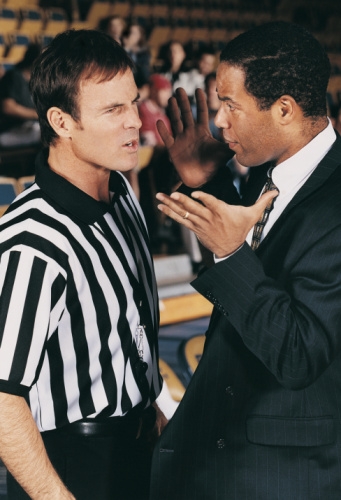As the commissioner of an interscholastic sports league in the San Francisco area, I am often asked whether it is ever appropriate for a parent to approach a game official during a break in the action to point something out to her.
The simple answer is never.
Spectators are a valuable part of the youth sports experience; however, they should not attempt to approach referees and coaches to provide their insights. Nothing good can come of it. Indeed, if every spectator decided to share their halftime insights with the referees we would, at best, have chaos, and at worst we'd have people at each other's or at the referee's throat. This is not what we want in the athletic arena.
Restraint in the face of adversity is one of the valuable life lessons that we learn as spectators, coaches and game participants. Part of this restraint is to learn to respect other people's zone of authority. The referee is charged with calling the game. Spectators may disagree with her judgment; they may see things that the referee should see or didn't see. However, part of the educational mission of sports mandates that the spectator not approach referees, players and coaches to add his or her two cents worth.
Now, this is not to say that referees, players and coaches are not accountable. They all are. Referees are generally observed and evaluated by someone (the person responsible for assigning officials, their partners, paid evaluators, volunteer evaluators or coaches are the usual people who perform evaluations).
A referee's ability to rise through the ranks should be linked to evaluations. There may be individual cases where this does not hold true - it may be necessary to have a less experienced referee work that all important youth baseball playoff game. However, a well run referee's association ensures that the right official is assigned to the game. The responsibility for enforcing this systemic protection does not belong to the spectator at a game. Rather it belongs to league administrators and sports governing bodies. The spectator can ask the people who run the league what steps they took to make sure that they have trained officials who are subject to some sort of evaluation process.
This doesn't mean that your games will be perfectly officiated. Spectators will never be 100% happy. What it does mean is that we want a system that ensures that the high school game is not worked by the guy who is rated as a sixth grade official.
Finally, it is important to note that there's a severe shortage of referees in this country. Part of the reason for this is a severe lack of sportsmanship, which, unfortunately, sometimes takes the form of verbal or even physical assaults on officials. Always remember this when you think of approaching a referee. They don't know if you're a threat or not - and spectators don't belong on the court or field.
Posted March 17, 2011









